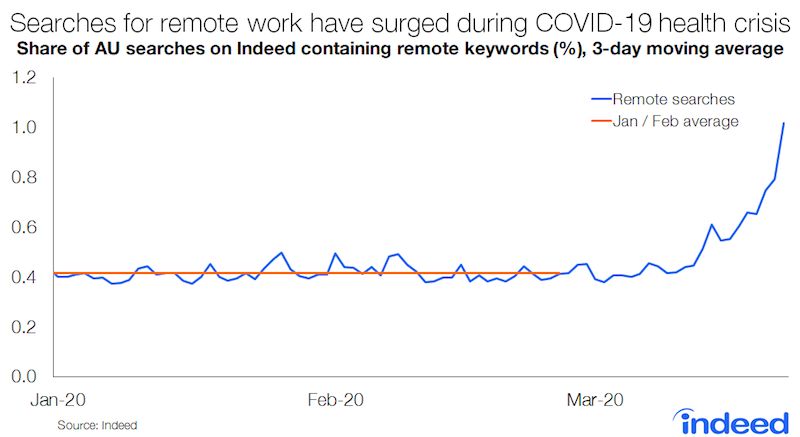Callam Pickering, APAC Economist at global job site Indeed, shares the impact of surges in job searches for remote work, and what organisations can do to create opportunities for people looking for work.
Searches for remote work on Indeed have surged over the past week. With thousands of Australians forced into self-isolation, jobs that you can perform from the comfort of your own home have never been more appealing.
Since 14 March, searches for remote work have surged and are now almost 150% higher than averages in January and February. Much of this increase has occurred over the past week as the government’s response to COVID-19 has escalated.

What recommendations does Indeed have for talent leaders who can offer remote work opportunities at this time?
Advertise your role on Indeed and other job boards. There are people looking for these opportunities every day. Before you post your job, be sure to review and refine your advertisement with three things in mind:
- Keep it clear and concise – now is the time to be transparent and list the minimum requirements of the role in a succinct and simple to read manner
- Remember “WIIFM” (What’s In It For Me?) – why is this the right opportunity and company for the candidate? What will they get out of this?
- Next steps – in the current climate, candidates may be applying for multiple positions with a range of employers. Be sure to list the next steps, even if it is simply when they can expect to hear from you, so that the candidate knows what to expect and is less likely to ghost you or move onto other applications.
In addition to job advertisements, now is the time for talent leaders to also be flexible. Be mindful that candidates may request different formats of interview (e.g. phone or video), or if you are requesting these formats, be aware that some candidates may not be comfortable with this new form of screening/recruitment. Provide information upfront and communicate effectively with candidates about expectations to reduce their anxiety and give them a chance to represent themselves in the best light.
How can organisations without current remote work opportunities put measures in place so that they can offer this?
Try to be open-minded. Yesterday’s fixed-premise job could be tomorrow’s most popular and productive remote working opportunity. Investigate the technologies you have at hand, and those available which will enable different types of roles to be performed remotely.
But it’s not just about technology. This will be a different way of working for employees and managers, so it’s important that everyone involved is well-prepared. If this is the first time you’re going to be offering remote working opportunities, it may be a good idea to do your research first. Whether it be accessing information on sites like Indeed, that offer tips to both candidates and managers on how to get the most out of remote working, or speaking to industry colleagues who are already making strides in this area.
The “ways of working” between employees and their managers is something that is best determined collaboratively, gaining active buy-in from both parties. Set expectations for check-ins, available hours when questions and contact is welcomed, and targets that need to be worked towards. Identify the support that each employee will need whilst working remotely, which may be more social or communicative, rather than tools and equipment.
And finally, employ behaviours that build trust. Be supportive that distractions will occur, ask for open and constructive feedback (both ways), and encourage creative ideas of how to be productive and meet goals in more innovative ways.
 Callam Pickering is an Economist at the Indeed Hiring Lab with a focus on Australia. Previously he was an economist at the Reserve Bank of Australia focusing on household spending and house prices. He also worked as the economic editor at online publications the Business Spectator and Eureka Report where he covered economic issues relating to Australia. Callam earned a Bachelor of Economics and Accounting from Monash University.
Callam Pickering is an Economist at the Indeed Hiring Lab with a focus on Australia. Previously he was an economist at the Reserve Bank of Australia focusing on household spending and house prices. He also worked as the economic editor at online publications the Business Spectator and Eureka Report where he covered economic issues relating to Australia. Callam earned a Bachelor of Economics and Accounting from Monash University.

